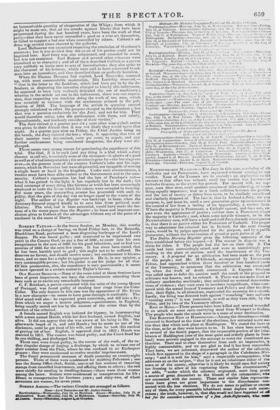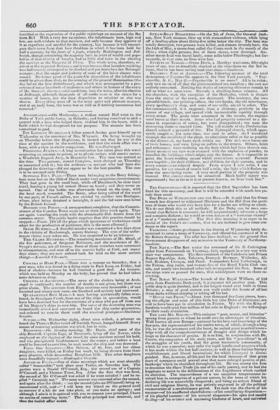NEWTOWNBARRY MASSACItE.-T110 JtITy in this case, consisting of sir Catholics and
six Protestants, have separated without coming to any verdict. None of the Yeomen arc in custody : an application to the coroner to that effect was refused, until the verdict was hunts-n-(1d kalendas Grwcas, as the event has proved. Tile flatter will, we suppose, soon blow over, until another occasion of tithe-collecting. or manething equally important, lead to a fresh collision between the parties, and the loss of twenty or thirty lives more, to be similarly considered and similarly disposed of. The fact is, that in Ireland a Jury, for toty purpose, is, and must be, until a new generation grow up accustomed to the control of law from a feeling of its impartiality, a useless form. Where the majority is Protestant, a Catholic cannot, and does not, expect even the appearance of justice ; neither does a Protestant where the majority is Catholic ; and, where some notable wiseacre, as in the Newtownbarry case, will have a half-and-halfJury,the only consequence is, that there is no justice either for Protestant or Catholic. The proper way to administer the criminal law in Ireland, for the next twenty years, would be by judges appointed for the purpose, and by a public prosecutor, without the intervention of grand or petit juries at all.
The Dublin Morning Register gives the following summary of the facts established before the inquest.-1. The matter in dispute was a claim for tithes. 2. The people had the law on their side. 3. The cattle had been unresistingly seized, and were as unresistingly proceeding to the place of auction, until the interference of the Yeomanry. 4. A proposal for an arbitration had been made on the part of the people ; and Mr. 11I'Clintock, accompanied by Lieutenant Feltus, had approached within three hundred or four hundred yards of the Yeomanry, to announce that the arbitration was conseuted to, when the work of death commenced. 5. Captain Graham was called upon.to defer the auction until tine result of the proposal to arbitrate was known, and he refused. 6. There was not more than an ordinary .market-day multitude; they exhibited no unusual demonstrations of violence ; they were even in numbers insignificant, when compared with the armed force of Yeomanry and•Police ; and after the first shot, their flight, in all directions, superseded the necessity fin. a second. Lastly, the firing was directed both against "crouching" men and men "running away ;" it was restrained, as well as they were able, by the Police, and by two of the Yeomanry officers.
RIOT IN MAYO.-Three persons have been killed and several wounded in an attack on some carts conveying meal from Westport to Gallen.. The people' who made the attack were in a state of utter destitution. THE ELECTION RIOT NT HADDINGTON.-Among the disturbances which occurred in Scotland at the time of the elections, few attracted more notice than that which took place at Haddington. We stated the facts at the time, as far as they were known to us. It has since been asserted, in several of the Scotch papers, that the respectable portion of the inhabitants of .Haddington (one of the most quiet and orderly places in Scotland) were actively engaged in the attempt to resist the constituted authorities. Theirzeal to clear themselves from such an imputation, is highly .commendable, and we are glad to find it has been successful. They have, we are Informed, discovered the author of the calumny, which first appeared in the shape of a paragraph in the Caledonian Mercury; "and it is well for him," says a respectable correspondent, who addresses us on the subject, "that he is not an inhabitant either of the town or of the county, otherwise it is likely he would soon feel society too freezing .to allow of his vegetating there. The circumstances,' he adds, "under .which the calumny originated, must Jong prove a sourcaof great ,discomfort to the friends of the calumniator, who are connected -with the county. These and similar false representations have _given too great importance to the disturbances connected with:the -late elections. We do not mean to palliate or excuse any of them, for every peaceable inhabitant must deplore such occurrences; the truth, however, is, that they would not have happened at..424 but for the excessive sowitiVeness of a few ,4nti-fiefortnere, who wese
horrified at the expression of the public rejoicings on account of the Reform Bill With a very few exceptions, the inhabitants here, high and low, are well-wishers to that measure, not only because they approve of it as expedient and needful for the country, but because it will emancipate their town from that base thraldom in which it has beeu held for half a century, by the junto of a junto, whereby Haddington and Jedburgh, though containing the majority both in point of wealth and population of that district of burghs, had as little real voice in the electing the member as the Emperor of China. The whole town, therefore, rejoiced at the expected Reform ; and it was because that harmless rejoicing was indiscreetly attempted to be checked and put down bya few Boroughmongers, that the anger and jealousy of some of the lower classes were roused. No better proof of the peaceable disposition of the inhabitants could be given than that, on the evening of the general illumination (the day before the first disturbance), and which was accompanied by a procession of many hundreds of tradesmen and others in honour of the entry of Mr. Stewart, the successful candidate, into the town, after his election at Jedburgh, although thousands of all ranks were in the street for a number of hours, not the least disposition to mischief or riot was shown. Every thing went off in the most quiet and pleasant manner, and at an early hour, the town was as still as if nothing uncommon had occurred."

























 Previous page
Previous page